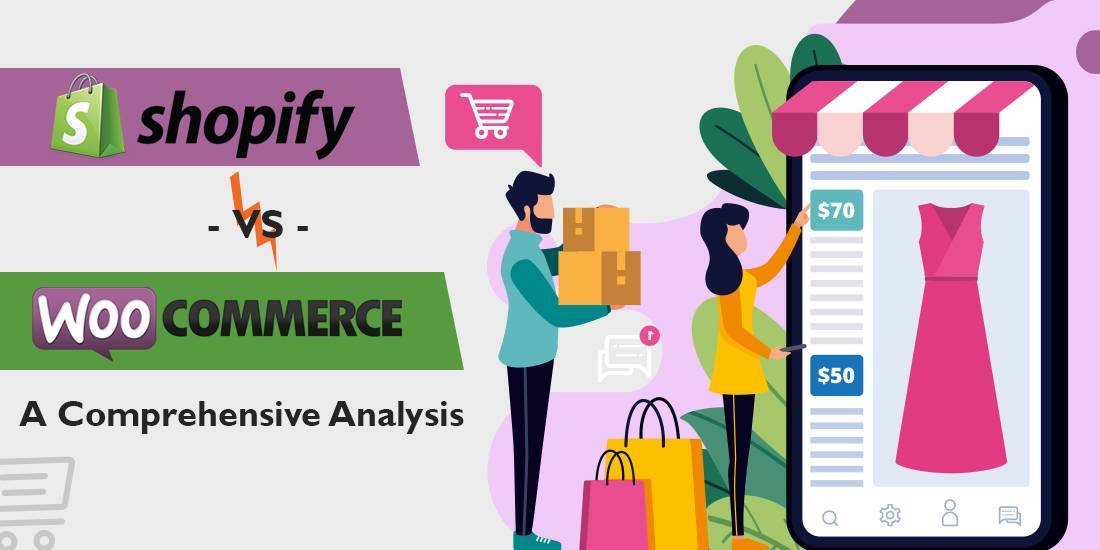Key Features and Benefits of Logistics Management Software
In this post, we will see the features, benefits, and trends in logistics management software. Before moving ahead, let’s understand logistics management and its importance. ...



Considering how to choose between WooCommerce and Shopify? If you’re planning to introduce an eCommerce shop, we’re reasonably sure you’ve come across these two eCommerce platforms as they are, by numbers, the two most prominent eCommerce platforms in the world.
Both ecommerce platforms have their merits, making it a tough choice, especially for something as significant as an e-commerce store. To find the right solution for your business, we will devote this post to exploring each platform and comparing and contrasting the two so that when you make your final decision, you can be sure.
When starting an online store, there are a few significant factors that should be kept in mind, which would assist you in determining which platform is suitable as per your requirements:
Budget:
The start-up cost of setting up a fully operational e-commerce store.
Ease of use:
It should be simple to operate for complete beginners.
Payment method:
It should be responsive to multiple payment methods. For example, Stripe, Paypal, etc., should be supported.
Integration:
You can arrange third-party tools and add up more services for your business growth.
Scalability:
The platform should be to able ascend as your business grows.
WooCommerce is an adjustable, open-source eCommerce platform developed on WordPress. You can get going swiftly and develop the store you want, whether it is launching a business or developing a website for the client. Complete ownership of data and content is provided under open source with a large and proficient community.

WooCommerce enables store managers to operate an e-commerce website by themselves, without taking any assistance from a web developer.Also, WooCommerce offers a free mobile application for the iOS and Android operating systems for its clients. WooCommerce is developed and maintained by Automattic, the architects of WordPress.com and Jetpack, along with autonomous contributors.
WooCommerce is open-source in nature, hence, it’s completely free. Anyone can modify its code since it is based on open participation.
WooCommerce is suitable when you have proficiency in WordPress and its interface. This enables you to set up your store immediately and, hence, make initial sales earlier.
There are themes available in abundance for this platform. Thereafter choosing the correct one, WooCommerce enables customization for each section.
WooCommerce’s core strength is its openness. It can adjust to any type of online shop. This platform can be modified to sell virtual, downloadable and physical products.
WooCommerce is updated regularly when it comes to cybersecurity. Woocommerce is thoroughly integrated with e-wallets and secure gateways, such as Paypal, Stripe, Payza or WePay.

Certain extensions/plugins of WooCommerce require a monthly subscription.
Adding extra extensions and plugins will affect the overall performance.
You will have to estimate the cost of enabling appropriate subscription services and other utilities.
The individual is required to have in-depth knowledge of both WordPress and WooCommerce and may still require professional help to get their website in working order for their customers.
The Plugins are uniquely made for WordPress and cannot be passed down to other sites that don’t use WordPress for content management.
A comprehensive trading platform that allows you to start, develop and operate a business. It lets you build and modify an online store and sell in different locations, including forums, social media, online stores, brick d-mortar locations, mobile, and pop-up shops.

There is no need to be concerned with updating or managing web servers or apps in Shopify as it is cloud-based. It grants you the convenience to use an internet connection for managing the business.Shopify provides you with a collection of tools to help you build and manage your online store. Experts from around the world would help you develop, plan and market your business. The Shopify app store also provides free and paid applications and themes to improve performance and make the website function and look great.
Shopify is completely hosted, thus, you are not required to install, manage and update anything. You also don’t have to bother about the security, performance or backups and compatibility issues.
Shopify presents numerous payment options that you can use to accept payments from customers. It provides a payment gateway called Shopify payments in addition to many other popular third party payment gateways.
Shopify comes with a strong API and an App Store where you can purchase third-party addons for your store. There are tons of apps in the store covering all the attributes you would want to add to your store.
Shopify handles all the technicalities of your store which means you don’t even have to bother about performance or security. You can make a choice to upgrade your plans when the business starts growing.
Shopify gives support via live chat, phone, email and twitter 24/7. It also gives extensive documentation, how-to guides, video tutorials and forums in case the user wants to try fixing things on their own.
Shopify payment gateways are accessible only in certain countries, hence, you will be required to use a third-party payment gateway to sell from another country.
Shopify themes are coded in self-developed PHP language called Liquid, which makes theme customization problematic unless the user has in-depth knowledge and required coding skills or can hire a developer to code Shopify themes.
mportant attributes such as reports, fraud analysis, gift cards, and real-time shipping rates are accessible only on higher-tier plans. The basic plans come only with barebone features that are required to run the store.
Many of the useful add-ons in Shopify are not free. This will increase your long term cost if you decide to use them.
Shopify, typically, is going to be more expensive on a monthly basis in comparison with a self-hosted store. Here, we do a detailed comparison of WooCommerce and Shopify based on a few parameters:
When making payments online, there are numerous payment gateways that you can use. Some payment methods may not be accessible to your customers while some may not be convenient for your needs. The system you select must offer various payment options. Know more about other money transfer P2P apps .
When it comes to payment integrations, let’s see how Shopify and WooCommerce can be compared.
Shopify offers its payment gateway called Shopify payments besides all the popular third-party payment gateways. The dilemma here is that Shopify will charge an extra 2% fees per transaction when it is completed through a third-party payment solution. This is in addition to the transaction fees charged by the particular payment gateway you choose .
WooCommerce accepts payments by default for Paypal and Stripe. Through add-ons, support for other popular payment providers can also be added. There is no barrier to entry, anyone can create payment addons for their WooCommerce platform. WooCommerce will never charge you a percentage fee for your store purchase, which is a big plus.
You will always require third-party tools and services to grow your online store. Both Shopify and WooCommerce accommodate any third party services.
With a powerful API and App store, you can purchase third-party addons for your Shopify store. The apps in the store include all the attributes that you would want to add to your store. Many free and paid apps are available.
As an open-source, WooCommerce provides you with access to more than fifty-five thousand free WordPress plugins and paid plugins.
If you plan to start an online store and are not a web developer or web designer, and need a platform that is easy to use, the following analysis on Shopify and WooCommerce in terms of user-friendliness may help:
Shopify is a fully hosted platform, i.e., you don’t have to bother about installing, managing or updating any software. Also, you don’t have to be concerned with security, performance, backups and compatibility issues.
WooCommerce isn’t like a Shopify host site. You will be required to install WooCommerce, update it regularly, perform backups and ensure the website’s security. Such functions can be done for you by free and paid plugins.
When starting an online store, the cost is often the most critical factor to consider for eCommerce website owners. One needs to assess the cost of getting started while keeping in mind the costs for add-on services and software.
The basic plan for Shopify has a monthly subscription. You can choose to upgrade the plan or choose an advanced plan every month. All these plans include the domain name, SSL certificate and web hosting. The pricing doesn’t include third-party tools and add-ons that you would require to grow your Shopify store.
WooCommerce is freely available as a WordPress plugin, however, you will need a domain name, SSL certificate, and a hosting account to start the WooCommerce store, along with their respective costs. This might not be cheap when starting but several hosting companies offer specialized WooCommerce hosting plans which will reduce the cost significantly.
Dropshipping is where an eCommerce store does not retain possession of the products in stock. Rather, it completes the orders by acquiring products from the merchant and then shipping them directly to the consumer.
The front-end of your website will look similar to any online store, your customers will be able to search the products, add them to a cart, and make payment similar to what they would do on other eCommerce platforms. Shopify incorporates apps for popular dropshipping like AliExpress, Oberlo, Printify, etc. Each of these product retail places has its association fees, shipping and other charges that you need to be aware of when building a dropshipping website with Shopify.
Among all the dropshipping businesses, WooCommerce is a favored choice because it enables you to install extensions that will make order completion simple. You can acquire extensions that will enable you to import products, fulfill orders from your website. You can establish your eCommerce marketplace allowing others to manage their business on your website.
As a business grows, you may be needing additional resources to handle new challenges. Both Shopify and WooCommerce are often extended to handle an enormous volume of traffic and orders. Since they’re different, here’s an analysis of both platforms in terms of quantifiability.
Shopify efficiently manages the technical aspect of the business, which suggests you don’t ought to worry about performance, security, and quantifiability. Once the business starts thriving, you’ve got the choice to upgrade your plans. The system of Shopify will easily handle your growing business without thinking about maintenance, backups, updates or protection. This eliminates the tough a part of the expansion, however, this will increase the value of your business.
WooCommerce enables you to manage the web platform independently, which ensures that you are responsible for your website’s updates, backups, and security. The WooCommerce hosting platform does not have sufficient resources when the store begins to get more traffic. There are plenty of choices since you are in complete control of your website, the price can increase however you are not required to pay for resources that you don’t require.
You might also require help when adding some new features to your store. Let’s analyze how WooCommerce and Shopify handle assistance and the choices they furnish in case you need assistance.
Shopify provides support through live chat, mobile, email, and Twitter. They handle the software since it is a host platform and has in-depth information about their application. Shopify offers extensive documentation, how-to guides, basic understanding, tutorials, and forums in case you want to try to fix issues on your own. You can also get in contact with professionals if you require help in integrating third-party solutions.
WooCommerce is a self-hosted platform, your internet hosting provider will be assisting in case there are problems with the server. The legitimate website offers documentation, tutorials, and courses that you can refer to assist yourself. Support boards consist of WooCommerce users and experts which you can reach out for guidance. In case of issues with extensions, developers that developed it are responsible for assisting with their products.
Shopify and WooCommerce are each sturdy platforms to kickoff your eCommerce store. It comes down to your specific requirements and choices. Shopify doesn’t want you to set up anything, and you can get started instantly. You don’t have total control across everything. Through transaction fees, add-ons, and integrations, the costs will increase. Your enhancing choices are constrained to pick up plans, and you can’t supervise charges on a pay as you grow basis. WooCommerce is an open-source platform that provides full control of your website. You will have to manage the software, it happens to have a bit of mastering curve.
If you are looking for a solution that is worthwhile without compromising your online store, WooCommerce is a better platform for you. If you don’t want any inconvenience while setting up an online store that has sizeable scalability, then Shopify is for you.

In this post, we will see the features, benefits, and trends in logistics management software. Before moving ahead, let’s understand logistics management and its importance. ...

In this post, we will cover the key benefits and disadvantages of NFTs with the highlight of future trends. Let’s understand the concept of NFTs and its importance in blockchain app development servic...

In this post, we will dig deep into the benefits of blockchain app development for modern businesses....